

![]()
![]()
![]()

Ladies and gentlemen, we are here tonight to remember Nigel Tranter, to honour him and to celebrate him. Most of you probably knew him in one way or another. It was a measure of the man that even the slightest contact with him made you go away feeling you had made a friend.
And you will remember him as a friend, a colleague, a writer; as a castles enthusiast, a
local institution - those famous walks along the coastline between Aberlady
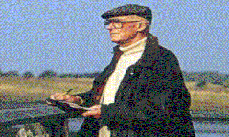 and Gullane; as a phenomenon of industry and longevity. It is natural on an
occasion like this, when he is being commemorated in a more permanent way in
the Nigel Tranter Centre here at Lennoxlove, that we should be taking stock a
little.
and Gullane; as a phenomenon of industry and longevity. It is natural on an
occasion like this, when he is being commemorated in a more permanent way in
the Nigel Tranter Centre here at Lennoxlove, that we should be taking stock a
little.
It's three years now since he died - not very long to start speculating about what posterity will make of the novels for which he was so famous. But time enough, I think, to take a look at his legacy to us.
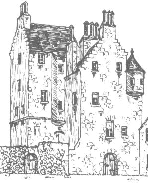 It's easy when you think about a man like Nigel Tranter to focus on the bit
that you knew - because that's the bit you treasure and that, after all,
is the bit you know best. But I'd like to suggest that you lift your
gaze a little. Nigel was a man of many parts and, in some ways, the whole was more than the sum of the parts.
It's easy when you think about a man like Nigel Tranter to focus on the bit
that you knew - because that's the bit you treasure and that, after all,
is the bit you know best. But I'd like to suggest that you lift your
gaze a little. Nigel was a man of many parts and, in some ways, the whole was more than the sum of the parts.
I said 'castles enthusiast'. Well, let us lift our mind's eye - if you can do such a thing - and think of our landscape here in East Lothian, think about the mark Nigel has made on that,think about Ballencrieff, Fenton and Fawside. Three representatives of the many little castles around the country that benefited from the original enthusiasm of the schoolboy hiding behind the hedge to draw the little ruined castles.
And then turn your eyes further afield and look up the Forth. Look up the
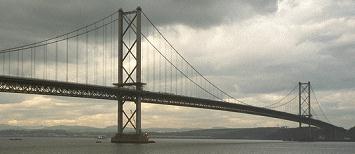 Forth to those two great bridges and remember, when you look at the
Road Bridge, that Nigel Tranter had a hand in that, too. For many years, the
key years in the creation of 'the road bridge', as it was in these days, not
as much a foregone conclusion as we think of it now, Nigel was chairman of
The National Forth Road Bridge Committee and a tireless proselytiser in
that cause.
Forth to those two great bridges and remember, when you look at the
Road Bridge, that Nigel Tranter had a hand in that, too. For many years, the
key years in the creation of 'the road bridge', as it was in these days, not
as much a foregone conclusion as we think of it now, Nigel was chairman of
The National Forth Road Bridge Committee and a tireless proselytiser in
that cause.
And now let us look back at Edinburgh. Not at the New Town, where he grew up, or the Mound that he raced up to go to school at Heriot's, not even the Royal Mile. Let's look first into a bookshop, Ottakers perhaps, that used to be Thin's, his old friend Jimmy Thin's bookstore.
Take a look at the shelves. Not the shelves that are still full of Nigel Tranter books, because we all know about that. Look instead at the shelves of Scottish History. Nigel Tranter, who brought our history alive again for us and gave us back our heritage in his historic novels, had a hand in that too, in this extraordinary upsurge of new books about different aspects of Scottish History.
Let's go on now and make our way down the Cowgate, and you'll find at the bottom the magnificent new palace of our national parliament. Longevity has its drawbacks, and Nigel Tranter lived long enough for the great endeavours of his middle years to fade from men's minds. For Nigel was very much involved with the National Convention and the National Covenant itself, which will perhaps come more readily to your minds: the National Covenant, which was signed by almost two million people - an absolutely unbelievable number of signatures, and fantastic support for a pledge by all those people who signed it that they would do all they could to bring about a measure of devolution in Scotland.
Fifty years it took us, give or take a year, to achieve it, but Nigel, who was in on it from the end of the 40s and 50s on, lived to see the new parliament open.
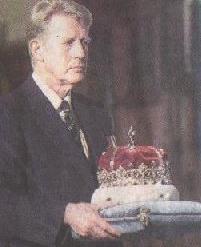 I have two vivid memories of the devolution process. I remember the great
thrill of Christmas 1950 when Ian Hamilton and his friends spirited the
Coronation Stone out of the Abbey. It was the most astounding thrill. The
other one that I remember vividly was July 1999, when our host tonight, His Grace the Duke of Hamilton,
brought the Crown of Scotland out of Edinburgh Castle and took it down to
place in front of the Queen at the opening of the Scottish Parliament - our new parliament. And Winnie Ewing told us we we're back in business.
I have two vivid memories of the devolution process. I remember the great
thrill of Christmas 1950 when Ian Hamilton and his friends spirited the
Coronation Stone out of the Abbey. It was the most astounding thrill. The
other one that I remember vividly was July 1999, when our host tonight, His Grace the Duke of Hamilton,
brought the Crown of Scotland out of Edinburgh Castle and took it down to
place in front of the Queen at the opening of the Scottish Parliament - our new parliament. And Winnie Ewing told us we we're back in business.
These two events, in a sense, also bound together Nigel Tranter's contribution to Scotland as it is today, and it's a great thrill to have here tonight David Steel, our first Presiding Officer, Ian Hamilton, and of course to have as our host the man who carried the crown.
I started off by suggesting that you look at the permanent monuments: the castles, the bridge and the parliament. These are no mean memorials, ladies and gentlemen. None of us are likely to leave that kind of mark on our country.
But of course we come back inevitably to the historical novels that made Nigel Tranter a household name, not only in Scotland but in Scottish communities throughout the world.
So I am going to finish by reading you some passages from Nigel's own work. Some of you have perhaps heard them before and will recognise them. I read them at his memorial service. And in so doing, I inaugurate this splendid new venture of the Nigel Tranter Centre.
![]()
Ray then read the following;
Columba sets foot on Iona for the first time.
Columba was all eagerness to land at once. And when, as they approached the first lovely bay, and were scanning its translucent waters to see if they were deep enough to take
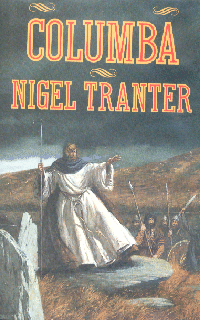 their long-ship, a heron rose from the tide's edge, and flapped away lazily round the shoreline, he cried out "See - my bird. It is a sign. In,Machar, in here. We will land from the coracles."
their long-ship, a heron rose from the tide's edge, and flapped away lazily round the shoreline, he cried out "See - my bird. It is a sign. In,Machar, in here. We will land from the coracles."
The water was so clear and the sand below so pure white, every pebble and tendril of weed and wrinkle showed as through a window. The long-ship was barely halted before he was over the side and paddling, shouting for joy like a boy, kilting up his abbot's robe to splash ashore. On the dry sand he fell on his knees and kissed the ground.
Still kneeling there, he picked up handfuls of the glittering white sand, and let it dribble between his fingers, laughing towards the others who were following his lead. None had ever seen Colum mac Felim so happy."
Wallace confronts Bruce
"Your conversion to Scotland's cause is something sudden, my lord of Carrick! You have lands in England. It may be that you are more concerned with England's cause than Scotland's. You doubt my honesty, sirrah?"
"I doubt your interests.
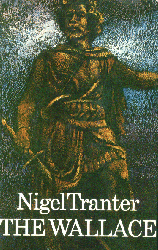 Where your heart lies. I regret, my lord, if I spoke ill. But it may be that I speak for others than do you. You all. You, my lord Bishop, speak for Holy Church. And these noble lords? Who do they speak for? Themselves, their lands, the power of the realm. But who speaks for the people of Scotland, my lords. Does any here? This Scotland is more than a realm, my friends, it is a nation. A people, an ancient people. A people that has been betrayed, and sold, and spurned.
All but forgotten by those that seek the power."
Where your heart lies. I regret, my lord, if I spoke ill. But it may be that I speak for others than do you. You all. You, my lord Bishop, speak for Holy Church. And these noble lords? Who do they speak for? Themselves, their lands, the power of the realm. But who speaks for the people of Scotland, my lords. Does any here? This Scotland is more than a realm, my friends, it is a nation. A people, an ancient people. A people that has been betrayed, and sold, and spurned.
All but forgotten by those that seek the power."
"But it is the people who will pay for what is decided this day. You lords, I swear, will survive, whoever rules. Even if Scotland is no more, you will still be lords. But not the common folk, the Scots. Do you ever think of them, my lords?"
The death of Montrose.
So the final journey commenced, up the Canongate's cobbles between the grey gabled lands and tenements. At a snail's pace, in silence save for the clop-clop of the horses'
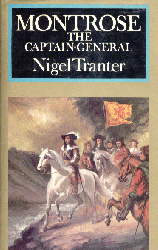 hooves, the creaking of the cart and the shuffling of feet, the procession made its way up the crowded thoroughfare, with scarcely room to pass and whatever men and women thought, not a hand was raised.
hooves, the creaking of the cart and the shuffling of feet, the procession made its way up the crowded thoroughfare, with scarcely room to pass and whatever men and women thought, not a hand was raised.
Montrose climbed the final ladder unhurriedly. It had been a dull cloudy day, with a chill wind off the sea, and as he stood waiting, while the other put the noose round his neck and adjusted the knot, a brilliant shaft of sunlight struck down to irradiate the ancient street. He had never loved this towering city, but in the sudden illumination of light and colour and shadow, he seemed to see it differently, a place of two faces, two characters, ever at war with itself, cold yet seeking warmth, harsh yet wistfully lovely, steeped in blood yet somehow innocent - like the nation of which it was the capital, self-torn to its enduring hurt.
"God have mercy on this afflicted land!" he said aloud, and the man at his back pushed and launched him from the platform. A great, gulping sigh swept the crowd, the rope jerked taut, and James Graham left Edinburgh gladly for a better place.
![]()
PLEASE NOTE:These are reading texts only, as agreed with Nigel Tranter's heirs for reading at his Memorial service in 2000, and should not be quoted in this form: for full texts see 'Columba', 'Wallace', and 'Montrose: the Captain General'